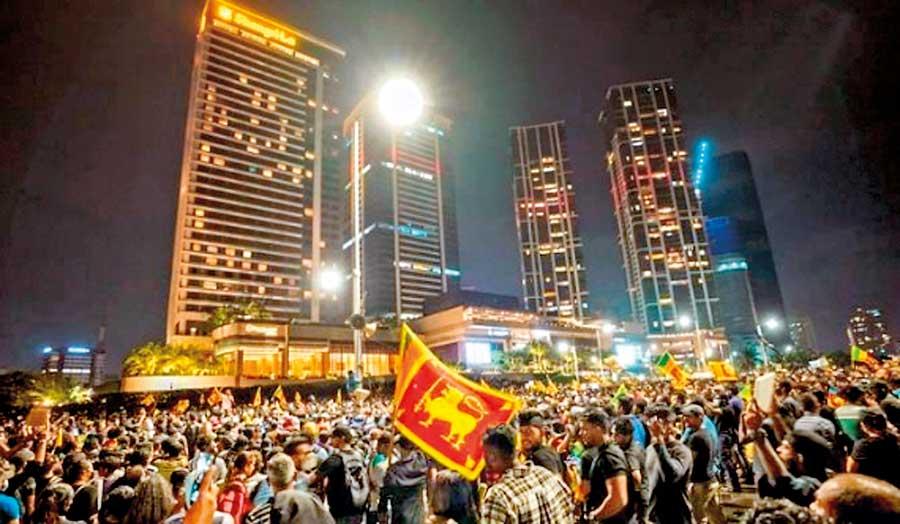11 Apr 2022 - {{hitsCtrl.values.hits}}

Thousands of protestors; mainly young men and women with no political affiliations or leadership, gathered at the Galle Face Green, despite pouring rain and other obstacles, demanding President Gotabaya Rajapaksa and his government to step down.
“This country, with its institutions, belongs to the people who inhabit it. Whenever they shall grow weary of the existing government, they can exercise their constitutional right of amending it, or exercise their revolutionary right to overthrow it”.
- Abraham Lincoln - inaugural address: March 4, 1861
However, the revolutionary right that existed 160 years ago is no longer valid. It should be the constitutional right; exactly what the young independent [FB?] groups agitate carrying placards- “Gota Go” - “Down with 225 +1”. Abraham Lincoln, the lawyer and statesman was the 16th American President [1861-65] who led the nation through the Civil War until his assassination in 1965. The simplest form of definition of Democracy, he used in ending the speech delivered during the dedication of the Cemetery in Gettysburg on November 19, 1863, says, “Government of the people, by the people, for the people, shall not perish from the earth.” In Sri Lanka, we have witnessed all varieties of them; ‘government of the people, by the people, without the people’ however, we are yet to see a government that satisfies the third criterion, ‘for the people.’
placards- “Gota Go” - “Down with 225 +1”. Abraham Lincoln, the lawyer and statesman was the 16th American President [1861-65] who led the nation through the Civil War until his assassination in 1965. The simplest form of definition of Democracy, he used in ending the speech delivered during the dedication of the Cemetery in Gettysburg on November 19, 1863, says, “Government of the people, by the people, for the people, shall not perish from the earth.” In Sri Lanka, we have witnessed all varieties of them; ‘government of the people, by the people, without the people’ however, we are yet to see a government that satisfies the third criterion, ‘for the people.’
"Sri Lanka’s history is at a turning point. While the US/NATO –Ukraine/Russia war is creating conditions for a massive rise of the poor around the globe as food and fuel shortages take hold alongside skyrocketing inflation in most countries. After two years of a distressing pandemic, struggles are escalating on every continent"
Exactly hundred years later, there emerged an American President affectionately referred to by his initials John F. Kennedy, who served as the 35th president [1961-63] until his assassination in similar fashion on November 22, 1963. Kennedy addressing the first Anniversary of the Alliance for Progress in Washington said, “Those who make peaceful revolution impossible will make violent revolution inevitable.”
Sri Lanka’s history is at a turning point. While the US/NATO –Ukraine/Russia war is creating conditions for a massive rise of the poor around the globe as food and fuel shortages take hold alongside skyrocketing inflation in most countries. After two years of a distressing pandemic, struggles are escalating on every continent.
A decent crowd sans any dirty politics had joined the agitation held in Mirihana, in front of the president’s residence. A few hours later, an organized politically backed trouble-makers hijacked the campaign compelling some of the decent middle class men and women to ‘back out’, and for others, mainly the youngsters to occupy a ‘back seat’ in suspense when a third group of uncivilized hooligans appeared from nowhere, and used ‘fire-power’. A mysterious bus was set ablaze, stones and other objects were pelted to provoke police. They were dispersed with tear gas and water cannons. Though marred by unfortunate happening there on March 31, it triggered a chain of actions by independent and leaderless youth who made strategically significant and widely applicable changes in the political and social scenario of Sri Lanka.
Bloodshed ’53-First Mass Uprising
Following Machiavelli who infamously said, “The promise given was a necessity of the past and the word broken is a necessity of the present,” they disregarded the party manifesto’s promise, ‘…as long as Sun & Moon exists, the subsidized rice ration it will remain intact’, the government soon faced depletion of foreign reserves causing a big economic crisis in the 1952/53 financial year.
JR Jayewardene, in Dudley Senanayake’s 1952/53 government, attempted to make an overnight drastic cut in the rice subsidy making the two measures of imported rice cost the poor 45 cents more [from 25 to70 Cents] along with simultaneous pruning down of several welfare measures. Masses responded to leftists call for Hartal. The protest on August 12, turned out to be a violent mass uprising and spread over to Marxist strongholds in seven districts. Rails and fish plates were removed in railway lines; telegraph posts toppled in many areas; sleepers were torn up and set on fire bringing trains in the Southern line to a halt for a few days. Explosives were used to damage small bridges.
"A Massive but peaceful uprising swept the island nation demanding the exit of President Gotabaya Rajapaksa in rebelliousness of a state of emergency/curfew and the deployment of elite forces and police in the streets. The general public, especially the non-political, leaderless youth are calling for an end to the current political set up"
Public officers were summoned on board the British warship ‘HMS Newfoundland’ where the government politicians sought refuge— it was decided to bring certain affected districts under Martial law. An emergency was declared with a twenty four-hour curfew. The armed forces were authorized to use fire-power to quell the uprising who shot and killed nine; but restored welfare and the rice at 50 cents.
A Massive but peaceful uprising swept the island nation demanding the exit of President Gotabaya Rajapaksa in rebelliousness of a state of emergency/curfew and the deployment of elite forces and police in the streets. The general public, especially the non-political, leaderless youth are calling for an end to the current political set up. They have resented attempts by some opposition members from participation in their struggle; media reported two such instances, one in Kegalle, where they chased away Hirunika and SJB supporters and in Tissamaharama SJB MP, Dilip Vedaarachchi was politely requested to leave the vicinity.
Light at the End…?
The highly-respected former senior deputy governor, and economist, Dr. Nandalal Weerasinghe was overlooked by Yahapalana in favour of a world renown Singaporean swindler, for them to loot and empty the CB coffers, obviously with a view of sharing the spoils. With the arrival the Rajapaksa's, outsider Prof. Laxman served until another former controversial character returned to continue the pillaging once again, who had to resign amidst present turmoil. Dr. Weerasinghe is back, with the blessings of Gotabaya Rajapaksa, who was brought to his knees by the protests and the utter collapse of the economy. Dr. Weerasinghe along with another top economist who has now been brought in to head the Finance Ministry are confident that they can revive the economy, provided politicians keep away from interfering. However, answering the media, they warned the country that the next few months would see drastic measures being taken and that the public could experience more severe hardships. He implied that the imposition of inevitable cuts in subsidies and interest rate adjustments may further embarrass the government, but for the greater benefit of the economy in the long run. Continuing answering the combined electronic media on Friday night, the panel of experts emphasized the importance of maintaining the political as well as the social stability in the country, in view of pending negotiations with the IMF.
"Dr. Weerasinghe along with another top economist who has now been brought in to head the Finance Ministry are confident that they can revive the economy, provided politicians keep away from interfering"
It appears that some of the 225 are on a mission, collecting signatures for a NCM and an Impeachment, which may put a spoke in the efforts of the two proficient men who have undertaken an extremely tough task of negotiating with IMF for revitalizing the economy that had been ruined by successive administrations. However, it is likely that most of the parliamentarians would want it delayed rather pushing the country towards an ill-affordable election, at a time the nation is engulfed in a volcanic inferno. An Impeachment, they know is a rather strenuous process, absolutely with no chance of achieving anything practical, apart, may be from drawing the attention of aid agencies, hampering Sri Lanka’s chances.
The nation must ignore the empty rhetoric by foul-mouthed ‘highway robbers’ and pay attention to the new public officers, who for the first time in the post 78 history, have exhibited their fearless attitude by openly criticizing politico backed blundering, [a lesson for all senior public officers, including the AG] and also outlining their strategies for pulling the country out of the desperate situation it is in through an independent Central Bank.
26 Dec 2024 8 hours ago
26 Dec 2024 9 hours ago
26 Dec 2024 26 Dec 2024
26 Dec 2024 26 Dec 2024
26 Dec 2024 26 Dec 2024